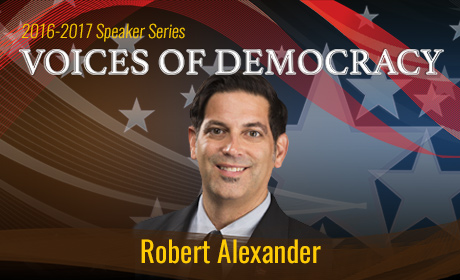Robert Alexander on the Electoral College

Photo Courtesy of Baldwin Wallace University
March 14, 2017
On Wednesday February 22, Voices of Democracy – a political speaker series held here at BW – welcomed speaker Robert Alexander on “Why the Electoral College Could Not Stop Trump”.
Robert Alexander is the department chair of Political Science, History, and Criminal Justice at Ohio Northern University. Author of “Presidential Electors and the Electoral College” Robert Alexander’s works are critically acclaimed, earning him interviews on C-SPAN, MSNBC, and NPR.
Robert Alexander’s knowledge regarding the Electoral College comes as a result of his Centrist political views The important thing to note about centrists, Alexander stressed, is that the only thing they strongly oppose is any factor tending to enforce a dominance of either the Republican or Democratic party.
According to Alexander, the Electoral College follows “a process that consists of the selection of the electors, the meeting of the electors where they vote for President and Vice President, and the counting of the electoral votes by Congress.”
The Electoral College consists of 538 electors. 270 electoral votes are required to elect the President.
In fact, Alexander said, members of the Electoral College can either be politically prominent or randomly assigned individuals.
More importantly, the electoral college is designed to protect us from Presidents that are not qualified to serve.
The Electoral College has come under recent fire because of the disparity between the popular vote and electoral vote.
In regards to Trump’s electoral victory, Robert Alexander stated it was impossible for him not to win. Even though Clinton and Trump had almost identical campaign trails, and Clinton did win the popular vote, Alexander said that Trump’s win was due to the states that he secured.
During his discussion, Alexander recalled a time when a student at one of his lectures pointed out that if you take out states such as New York or California – some of the states that Clinton won – and gave them to Trump, he would win the popular vote as well.
The electoral college is dependent on the states, and not just the “big populous states” as Alexander describes them.
According to Alexander, Trump won the electoral college because he spoke to the interests of states such as Montana, The Dakotas, Oklahoma, and Wyoming. These states added up in the Electoral College, and those votes are the reason our president of the United States of America is Donald J. Trump.










































